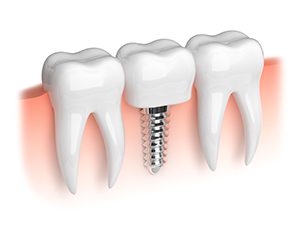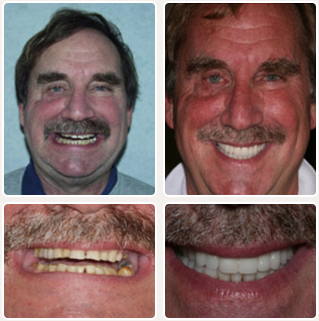Dental Implants
 The dental implant is one of the most important and revolutionary breakthroughs in the field of restorative dentistry. Dental implant procedures allow you to replace a missing tooth (or teeth) with results that look, feel, and function like a natural tooth. They are designed to be a permanent missing tooth replacement that eliminates many of the drawbacks that are often associated with traditional dentures. Our highly skilled prosthodontist, Dr. Yash Kapadia, and his team at Beautiful Smiles can help you enhance both the function and appearance of your teeth with advanced dental implant restorations.
The dental implant is one of the most important and revolutionary breakthroughs in the field of restorative dentistry. Dental implant procedures allow you to replace a missing tooth (or teeth) with results that look, feel, and function like a natural tooth. They are designed to be a permanent missing tooth replacement that eliminates many of the drawbacks that are often associated with traditional dentures. Our highly skilled prosthodontist, Dr. Yash Kapadia, and his team at Beautiful Smiles can help you enhance both the function and appearance of your teeth with advanced dental implant restorations.
- What Are Dental Implants?
- Dental Implants Benefits
- Dental Implants Candidates
- Types of Dental Implants
- Dental Implants Procedure
- Dental Implants Comfort
- Dental Implant Risks
- Dental Implants Cost
- Dental Implants Alternatives
- Additional Dental Implants FAQs
What are Dental Implants?
A dental implant is composed of a titanium post that is anchored to the jawbone in the area of the missing tooth. Once the implant is placed, it should fuse to the bone, replicating the function of a natural tooth root. When the implant has secured itself to the jawbone, a custom-made dental implant crown is attached to the top of the post. The implant and implant crown are created to provide the most comfortable and stable fit with a natural-looking appearance and feel. It should be virtually indistinguishable from your natural teeth.
What are the Benefits of Dental Implants?

Dental implants offer a broad range of benefits for individuals who have a single missing tooth or multiple missing teeth. The potential advantages of this procedure include:
- No movement or slippage along the gums (which is a common issue with ill-fitting dentures)
- A permanent replacement option for missing teeth
- Improved ability to chew, bite, and speak
- No food restrictions
- Results designed to look and feel natural
Am I a Candidate for Dental Implants?
The best candidates for dental implants are typically individuals who have one or more missing teeth and have an adequate amount of jawbone density for the implant to securely fuse to the bone. Individuals must be in relatively good general health for treatment with dental implants. If you currently have periodontal disease, it may be treated before dental implantation so that it does not affect the healing process.
Dental implant procedures have advanced greatly over the years, and those who have been previously told that they were not candidates may now be eligible. The best way to determine your candidacy is to be evaluated by Dr. Yash so that he can talk with you about your options. If you are not a candidate for full dental implants, options such as implant-supported dentures or dental bridges can often serve as effective alternatives.
s
What Are the Types of Dental Implants?
There are numerous variations of dental implants for patients with distinct needs and goals. Some of the more popular types of dental implants include:
Single Tooth Implants
Even just one missing tooth can be problematic, ultimately causing a negative effect on chewing and speaking, in addition to the potential loss of jawbone density. Replacing a missing tooth with a dental implant can often be an ideal alternative to a traditional dental bridge.
Learn more about single tooth dental implants.
Implant Bridges
Like a standard dental bridge, implant bridges are designed to fill the gap that multiple missing teeth create between two natural teeth. The difference is that, rather than the bridge relying on the surrounding teeth for support, it is supported by dental implants, instead.
Implant-Supported Dentures
Individuals with several missing teeth or complete sets of missing teeth on the upper dental arch, the lower arch, or both arches can often benefit from implant-supported dentures. Also known as “implant dentures,” these advanced treatments essentially combine the best aspects of dental implants and custom dentures to provide comprehensive teeth replacement that look, feel, and function like original teeth. By creating a custom denture with strategically placed dental implants, there is no need for denture pastes or adhesives to prevent movement along the gums. Implant dentures can frequently serve as good alternatives for patients missing most or all of their teeth and do not want to replace each missing tooth with a dental implant.
Learn more about implant dentures.
How is the Dental Implant Procedure Performed?
Once Dr. Yash has determined your candidacy for dental implants, he will develop a personalized treatment plan. Detailed x-rays will be used to identify the best possible placement for the implant in the area of the missing tooth, allowing for the most precise fit and results that feel natural. An oral surgeon or periodontist will then anchor the titanium implant to the jawbone, where it will begin a process called osseointegration (fusion with the bone). It takes a few months for the osseointegration process to complete. Once this has occurred, Dr. Yash will create the custom-designed implant crown. The implant crown will be created to yield a natural look.
Does the Dental Implant Treatment Hurt?
In most cases, the dental implant treatment process involves very little discomfort due to a local anesthetic being applied to the area beforehand. We will do everything possible to ensure your treatment is as comfortable as possible.
Are Dental Implants Safe?
Dental implants have been utilized in restorative dentistry for decades, and have proven extremely reliable in their ability to successfully address many patients’ concerns. With that in mind, it’s important to understand that dental implant procedures involve oral surgery, and all surgical procedures carry some level of risk. Our dentist and team of specialists utilize state-of-the-art imaging and planning technology to make sure dental implants are placed as precisely and carefully as possible. These precautions can serve to minimize the possibility of implant failure and other risks of dental implant treatments while maximizing the potential for exemplary outcomes. Plus, by strictly following the post-operative instructions and recommendations that will be provided, patients can also help ensure that any risks involved with these procedures are significantly reduced.
What is the Cost of Dental Implants?
Since each treatment is customized to an individual’s needs, the total cost of dental implants will vary based on a number of factors, including the number of implants that are being placed, the materials being utilized, the complexity of the procedure, laboratory costs, and the skill/experience level of the dentist, the oral surgeon, and the periodontist. Once Dr. Yash has performed an evaluation and created a treatment plan, our treatment coordinator will produce an estimate of the total cost of the procedure and go over it with you. Our practice works with CareCredit®, a company that offers convenient and affordable dental treatment financing plans for qualified applicants.
What Are Some of the Alternatives to Dental Implants?
For individuals who are not candidates for dental implant procedures, and for those who simply would like to explore other options, there are alternatives available that can effectively replace missing teeth. One of the more common and successful alternatives is a traditional dental bridge. This option has been a standard restorative dentistry procedure for many years and has helped numerous patients replace their teeth with successful aesthetic and functional results. For those who are candidates for dental implants but want to avoid replacing multiple teeth with a dental implant for each one, options such as implant bridges or implant dentures may be the ideal selection. Once Dr. Yash has talked with you about your goals during the initial consultation, he can determine which missing teeth replacement option offers the best and lasting solution for your needs.
Additional Frequently Asked Questions About Dental Implants
How many dental implants will I need?
Your ideal amount of dental implants will ultimately be determined by the amount of teeth you are missing, the density of your jawbone, and your overall oral health. Whether you need a single-tooth implant or a full set of implant dentures, Dr. Yash will help you determine how many implants you need during your consultation.
Are dental implants covered by insurance?
Depending on the dental insurance provider, some dental implant procedures may be at least partially covered; however, a number of insurance companies may consider dental implants to be an elective treatment. A member of our staff here at Beautiful Smiles can help you determine whether your dental insurance policy offers coverage for dental implants.
Do dental implants look natural?
Not only are dental implants designed to look natural, but they are also made to feel and function like natural teeth!
How do dental implants feel?
Dental implants are designed to emulate natural teeth in function and appearance. While it may take several days for you to get used to the completed restorations, your implants should feel (and look) very close to your natural teeth soon afterward.
How do I clean dental implants?
One of the many benefits of dental implants is that the maintenance they require is often no different than what is necessary in a standard oral hygiene regimen. For most patients, daily brushing and flossing along with attending routine dental check-ups and cleanings as recommended is enough to consistently maintain the health, function, and appearance of dental implants.
How long does it take to get dental implants?
It is important to understand that dental implant procedures involve a number of stages that take place over several months. After the initial treatment planning stage is complete, the implant posts will be surgically inserted into the gum tissue and anchored to the jawbone. Over the next few months, the implants should fuse to the bone (osseointegration) and become a secure foundation for the permanent implant crown. During this period, temporary crowns can typically be placed in order to enhance both comfort and appearance while waiting for the osseointegration process to complete. Once it has been established that proper fusion with the jawbone has occurred, the permanent custom crown can be securely affixed to the dental implant, which is the final step of the process. The exact length of the treatment period differs from one patient to another; however, a general range can be anywhere from two to six months.
Will I need a bone graft for dental implants?
For some patients, Dr. Yash may recommend a bone graft procedure before implant placement. Also known as “pre-prosthetic surgery,” bone grafting involves replacing lost jawbone mass in the area of missing teeth with a small amount of bone material from donors, synthetic bones, or bones from elsewhere within the patient’s own mouth or body.
While some patients initially believe the term “bone grafting” sounds scary or uncomfortable, bone grafting is actually a very routine procedure that has helped many patients enhance the density of their jawbone to make it better able to accommodate a dental implant. Dr. Yash along with the surgeon will determine whether you need a bone graft after thoroughly examining your oral structures and having a CT scan taken.
Does smoking affect dental implants?
Smoking can have a serious detrimental effect on dental implants. Potential connections have been established between smoking and dental implant failure, and the risk of infection dramatically increases if smoking persists during the healing process. This could ultimately compromise healing and make the process much longer than normal. We advise patients who smoke to please quit the habit a minimum of one month before they have dental implants placed, and to make sure they do not start smoking again once the procedure has been performed.
Are there certain foods I should avoid with dental implants?
Although dental implants do not typically come with any food restrictions, part of maintaining your dental implants is practicing excellent dental hygiene. This not only includes regularly brushing and flossing, but also being aware of the effect your food has on your dental health. That said, be sure to follow a healthy diet and limit your consumption of sugary snacks.
Dental implants have helped individuals all over the world replace missing teeth with results that are beyond comparison. If you are considering dental implants, we invite you to contact us today with any questions you may have, or to schedule a complimentary consultation with Dr. Yash.



